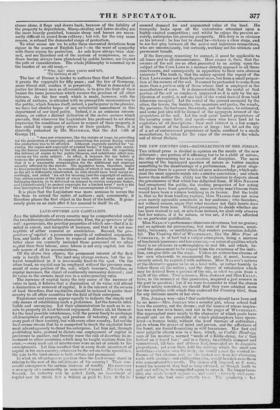LAND - OWNERS AND CAPITALISTS.
ALL the inhabitants of every country may be comprehended under the two following distinctive characters. First, the proprietors qf the soil; apossession, the peculiar properties of which are—that it is limited in extent, • and incapable of increase, and that it is not susceptible of either removal or annihilation. Second, the pro.: prietors c!/' capital; a possession capable of unlimited augmentation, and liable at all times to removal and destruction. In this latter class are correctly included those possessed of no other capital than their labour, since labour is not only capital, but the sole source of all its accumulations.
Of the above two classes, the permanent interest of the first ; only is locally fixed. The land may change owners, • but the interest transferred in it is irrevocably fixed to the spot. On the other hand, no capital can be employed without the previous command of some portion of the soil ; which becomes, therefore, as capital increases, the object of continually increasing demand ; and ; its value to the owners must rise in a corresponding ratio.
The increase of capital being the only cause of the increase of value to land, it follows that a diminution of its value will attend a diminution or removal of capital. It is the interest of the owners of land therefore, that capitalists should be induced to prefer their country to all other countries for the field of their enterprise. Experience and reason appear equally to indicate the simple and only means of establishing such a preference. Let the laws be intelligible and unvarying. Let their administration be such as to assure to property its least fettered enjoyment. Above all, let them offer the least possible interference, with the power freely to exchange all descriptions of property, and produce of industry, not only in every part of their country, but with every other country. Let not th,e lard-owner dream that he is competent to teach the capitalist how mast advantageously to direct his enterprise. Let him not, through prohibiting laws, pretend to dictate one employment of capital in preference to another, and thereby incur the risk of diverting its investment to other countries, which may be taught wisdom from his error ;—every such act of interference were an act of suicide to his own interests. Let him recollect that in every fresh investment of capital in his own country, whatever be the return to the speculator, the gain to the land-owner is both certain and permanent. In what an advantageous position does the land-owner stand in relation to the rest of the inhabitants of his country ! Their successful enterprise is his certain increase of wealth. He poseeeses mompoly of a commodity in universal demand. No trade can flourish, no industry can be called forth, no investment of capital can be made, but a tribute is paid to him, in the in creased demand for and augmented value of the land. He tranquilly looks upon all the vicissitudes attendant upon a. highly-excited competition ; and whilst he enjoys the present securely, anticipates his growing prosperity. His duty is as obvious as his interest : he has but to stand by—to keep a clear stage, and to see fair play between all the active and ingenious competitors, who are unconsciously, but certainly, working out his ultimate and permanent benefit.
If the foregoing reasoning be correct, it must be applicable to all times and to all circumstances. How comes it, then, that the, owners of the soil are so often presented to us acting upon the subject of the Corn Laws in a manner directly opposed to all these conclusions, and consequently in opposition to their own obvious interests ? The truth is, that the outcry against the repeal of the Corn Laws comes not from the great muss, but from a small proportion of the owners of the soil. It cannot be pretended to come front more than a portion only of those whose land is employed in the manufacture of corn. It is demonstrable that the rental of that portion of the soil so employed, improved as it is only by the application of capital, is not one half of the rental derived from land otherwise occupied. Let the rental of the ground occupied by the cities, the towns; the hamlets, the mansions and parks, the woods, the pastures, the harbours, the canals, and the mines, be estimated, and some just idea will be formed of the aggregate interest of the proprietors of the soil. Let the real great landed proprietors of the country come forth and speak—men who have land let to capitalists of all descriptions : their real interest is a fair sample of the interest of the land-owners at large : but let not the cry of a set of embarrassed proprietors of lands, confined to a single manufacture, be taken for the voice of the owners of the whole soil of Great Britain.














 Previous page
Previous page